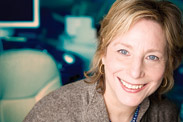No expiry on dreams
When a woman hits middle age, advertisers urge her to hide her years by using Botox injections and anti-wrinkle creams. While marketers tell her she is past her "best-before date," McGill nursing professor Laurie Gottlieb says her message would be, "You come to this period with unbelievable strengths. You can take charge of your life and you can identify something that's meaningful for you to do. Life can be great at this age."

McGill nursing professor Laurie Gottlieb, editor of the Canadian Journal of Nursing Research
Claudio Calligaris
She points out that women in their middle years have a lot going for them and are in an excellent position to make their dreams a reality. Gottlieb is in the midst of a book tour for Dreams Have No Expiry Date: A Practical and Inspirational Way For Women to Take Charge of Their Futures. She and childhood friend Deanna Rosenswig (McGill BCom and MBA) co-authored the book to realize their own long-cherished dream of working together.
They interviewed over 100 women as part of their research. While some interviewees, such as McGill's former chancellor Gretta Chambers and former University Relations Office Director Kate Williams are successful by any definition, Gottlieb says, "Every woman has a distinguished life that we can learn something from. It doesn't matter what they've done or what their external accomplishments look like; they have all accomplished something by coming to this point in life."
Gottlieb was a published authority on the subject of transition in academic circles long before she began work on this book. She is a former director and associate dean of the McGill School of Nursing, has a PhD in developmental psychology and 30 years of research and teaching at McGill examining factors that help people adapt to life changes.
"My research focused on two things: transition and early family transition, such as what happens to families when a second child is born." Gottlieb helped develop the McGill Model of Nursing, which involves examining the patients' goals, working with their strengths and respecting their readiness to move on. She says all life changes are similar: "There are tasks that have to be accomplished, identity issues that need to be reworked, roles that need to be learned and relationships that need to be renegotiated. For this book I looked at what happens when we are going through a transition and used some of the same theoretical underpinnings to look at transition to a new stage of life."
The authors intersperse theory with first-person stories. For those women not content to be just armchair dreamers, Gottlieb and Rosenswig offer exercises to help the readers identify and work toward their goals.
Gottlieb says that research on mid-life has increased, partially due to the fact that many researchers are middle-aged themselves. "When we looked at development 20 years ago it stopped in the early adult years. Now there is an interesting focus of research on the middle years." It sounds like things are looking up for women interested in a more meaningful goal than banishing those laugh lines.
